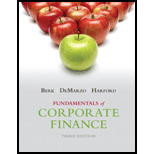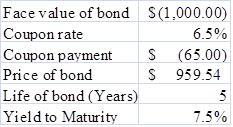
Concept explainers
Bond:
Bond is a form of borrowing that shows the debt obligations of a person or a company. A fixed rate of interest is paid on the bond till maturity.
Yield to Maturity:
It is total return on a bond to a bondholder till maturity. It is depicted as an annual rate. Simply it is the rate of
(a)
To determine:
The
(b)
To determine:
The total principal amount that Company HMK needs to issue.
(c)
To determine:
The rating of bond to sell them at par.
(d)
To determine:
The rating and classification of bond.
Calculate the yield to maturity to determine the rating of bond.
Given,
Face value is $1000.
Current price is $959.54.
Term to maturity is 5 years.
Formula to calculate yield to maturity is,
Where,
- YTM is the yield to maturity.
- CPN is the coupon payment
- FV is the Face value
- P is the current price
- n is term to maturity.
Calculate yield to maturity using rate function in excel.

The yield to maturity for bonds is 7.5% which means that bonds rating are BB as per the rating table given.
The bonds are junk bonds.
Want to see the full answer?
Check out a sample textbook solution
Chapter 6 Solutions
Fundamentals of Corporate Finance (3rd Edition) (Pearson Series in Finance)
- Option should be match. please don't use ai if option will not match means answer is incorrect . Ai giving incorrect answerarrow_forwardall frauds involve key elements. Identify and describe usingexamples the elements of fraudarrow_forwardSolve for maturity value, discount period, bank discount, and proceeds. Assume a bank discount rate of 9%. Use the ordinary interest method. (Use Days in a year table.) Note: Do not round intermediate calculations. Round your final answers to the nearest cent. face value(principal) $50000rate interest:11%length of note: 95 days maturity value: ?date of note: june 10date note discounted: July 18discount period:?bank discount:?proceeds:?arrow_forward
- What are the different types of audits and different types of auditors? WHat is an example of each type of audit? What is the significance of each from the perspective of different stakeholders?arrow_forwardDrill Problem 11-5 (Static) [LU 11-2 (1, 2)]Solve for maturity value, discount period, bank discount, and proceeds. Assume a bank discount rate of 9%. Use the ordinary interest method. (Use Days in a year table.) Note: Do not round intermediate calculations. Round your final answers to the nearest cent. face value(principal) $50000rate interest =11% length of note= 95 days maturity value=?date of note=june 10date note discounted= July 18discount period=?bank discount=?proceeds=?arrow_forwardSolve for maturity value, discount period, bank discount, and proceeds. Assume a bank discount rate of 9%. Use the ordinary interest method. (Use Days in a year table.) Note: Do not round intermediate calculations. Round your final answers to the nearest cent.face value(principal) $50000rate interest =11%maturity value=?date of note =june 10date note discounted= July 18discount period=?bank discount=?proceeds=? i need an explanation I am having a lot of trouble to solve thisarrow_forward
- many experts giving wrong solAnswer should be match in options. Many experts are giving incorrect answer they are using AI /Chatgpt that is generating wrong answer. i will give unhelpful if answer will not match in option. dont use AI alsoarrow_forwardAnti-Pandemic Pharma Co. Ltd. reports the following information inits income statement:Sales = $5,250,000;Costs = $2, 173,000;Other expenses = $187,400;Depreciation expense = $79,000;Interest expense= $53,555;Taxes = $76,000;Dividends = $69,000.$136,700 worth of new shares were also issued during the year andlong-term debt worth $65,300 was redeemed.a) Compute the cash flow from assetsb) Compute the net change in working capitalarrow_forwardQuestion 3 Footfall Manufacturing Ltd. reports the following financial information at the end of the current year: Net Sales $100,000 Debtor's turnover ratio (based on 2 net sales) Inventory turnover ratio 1.25 Fixed assets turnover ratio 0.8 Debt to assets ratio 0.6 Net profit margin 5% Gross profit margin 25% Return on investment 2% Use the given information to fill out the templates for income statement and balance sheet given below: Income Statement of Footfall Manufacturing Ltd. for the year ending December 31, 20XX (in $) Sales 100,000 Cost of goods sold Gross profit Other expenses Earnings before tax Tax @50% Earnings after tax Balance Sheet of Footfall Manufacturing Ltd. as at December 31, 20XX (in $) Liabilities Amount Assets Amount Equity Net fixed assets Long term 50,000 Inventory debt Short term debt Debtors Cash TOTAL TOTALarrow_forward
- Toodles Inc. had sales of $1,840,000. Cost of goods sold, administrative and selling expenses, and depreciation expenses were $1,180,000, $185,000 and $365,000 respectively. In addition, the company had an interest expense of $280,000 and a tax rate of 35 percent. (Ignore any tax loss carry-back or carry-forward provisions.) Arrange the financial information for Toodles Inc. in an income statement and compute its OCF? All computations must be done and shown manually. Kindly no spreadsheetcomputations. So that I am able to follow and understand clearly please.arrow_forwardJingle Ltd. and Bell Ltd. belong to the same industry. A snapshot of some of their financial information is given below: Jingle Ltd. Bell Ltd. Current ratio 3.2 1 2 1 Acid-test ratio 1.7 1 1.1 1 Debt Equity ratio 30% 40% Times interest earned 6 5 You are a loans officer and both companies have asked for an equal 2-year loan. i) ii) If you could facilitate only one loan, which company would you refuse? Explain your reasoning briefly If both companies could be facilitated, would you be willing to do so? Explain your argument briefly.arrow_forwardWaterfront Inc. wishes to borrow on a short-term basis withoutreducing its current ratio below 1.25. At present its current assetsand current liabilities are $1,600 and $1,000 respectively. How muchcan Waterfront Inc. borrow?arrow_forward
 Essentials Of InvestmentsFinanceISBN:9781260013924Author:Bodie, Zvi, Kane, Alex, MARCUS, Alan J.Publisher:Mcgraw-hill Education,
Essentials Of InvestmentsFinanceISBN:9781260013924Author:Bodie, Zvi, Kane, Alex, MARCUS, Alan J.Publisher:Mcgraw-hill Education,

 Foundations Of FinanceFinanceISBN:9780134897264Author:KEOWN, Arthur J., Martin, John D., PETTY, J. WilliamPublisher:Pearson,
Foundations Of FinanceFinanceISBN:9780134897264Author:KEOWN, Arthur J., Martin, John D., PETTY, J. WilliamPublisher:Pearson, Fundamentals of Financial Management (MindTap Cou...FinanceISBN:9781337395250Author:Eugene F. Brigham, Joel F. HoustonPublisher:Cengage Learning
Fundamentals of Financial Management (MindTap Cou...FinanceISBN:9781337395250Author:Eugene F. Brigham, Joel F. HoustonPublisher:Cengage Learning Corporate Finance (The Mcgraw-hill/Irwin Series i...FinanceISBN:9780077861759Author:Stephen A. Ross Franco Modigliani Professor of Financial Economics Professor, Randolph W Westerfield Robert R. Dockson Deans Chair in Bus. Admin., Jeffrey Jaffe, Bradford D Jordan ProfessorPublisher:McGraw-Hill Education
Corporate Finance (The Mcgraw-hill/Irwin Series i...FinanceISBN:9780077861759Author:Stephen A. Ross Franco Modigliani Professor of Financial Economics Professor, Randolph W Westerfield Robert R. Dockson Deans Chair in Bus. Admin., Jeffrey Jaffe, Bradford D Jordan ProfessorPublisher:McGraw-Hill Education





